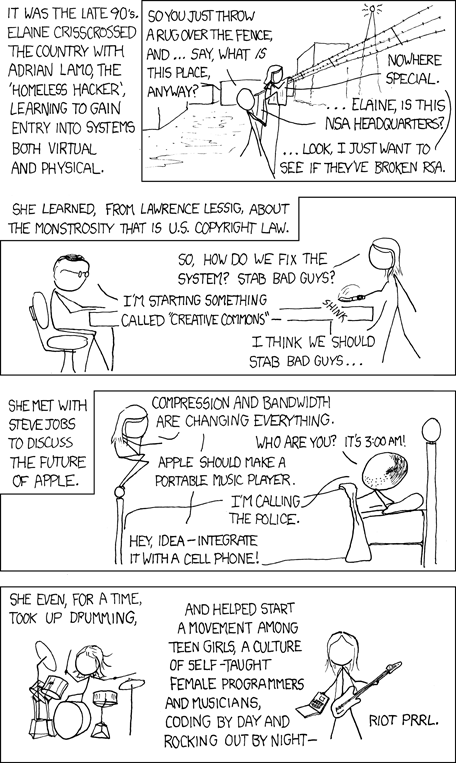The IITs are probably the most talked about institutes of higher education in India. And I am probably contributing to the volume of words that talk about these institutes but I can be excused because I am after all an alumnus of one of these prestigious institutes and talking about these institutes in general is something that I tend to almost every time I think about higher education, considering that is the only higher education I have ever had.
The IITs are perceived to be _the_ place to go to for higher education. It attracts the best minds in India, both as faculty and as students. Some of the faculty I met there were the most brilliant people in their respective fields. I am still in awe of some of them and I think I would never see such people together in one place ever again. But is education all about putting the best faculty and the best students together in one place and let them mingle in classrooms? Is that all that is required?
But before we answer all these weighty questions, what purpose do you think the IITs serve? Are they supposed to take students and mould them into people who are equipped with the knowledge and skills to innovate? Or are they supposed to create technically equipped workers for the rapidly growing industry (software industry, in particular)? Or are they supposed to create better citizens for the country?
Education is such a hard term to define. A lot of people would agree with me that education is not just the knowledge of terms and facts. But much of our school education is just that. Rote knowledge is expected and tested in our examinations that we take but higher education is supposed to go beyond that as it is expected that through the education we receive in our universities, we should be able to create new things that contributes to the progress of our society. But do the IITs help in this goal?
Abi has argued that the IIT model itself is flawed. One of the arguments that he makes against the IIOs (Indian Institutes of...) -
Ultimately, IIO blinkers us into an utterly unimaginative -- and some would say, delusional -- worldview which devalues academic disciplines that are not worthy of an Indian Institute. Isn't it absurd to even assume that anything other than technology, science, and management (and, if I may add, Hotel Management!) is unimportant for our country? Don't we need great economists to steer us through turbulence of globalization? Psychologists to help us deal with stresses from a fast-paced life? Artists to make our lives richer and more enjoyable? And philosophers to make sense of our uniquely human condition and our (almost) impending immortality?
This is something that I agree with completely. Some time ago, I read a blog post by another ex-IIT alumnus who argued about how little exposure to humanities we get in the IITs. Comparing with similar institutes in the United States like Caltech, he found that the number of credits/courses taken in the HSS department is far fewer (4 courses in the IITs vs. 12 mandatory courses in Caltech). Now that is a big difference. The IITs are very focused on the subject of study that the student has signed up for and does a pretty comprehensive job of that. But everything else is either ignored or given very little attention to.
Another area that the IITs do not pay any attention to is the students themselves. The IITs assume that the students have taken up the field of study that they are already motivated to study and would work on their courses with the appropriate amount of energy and perseverance. Therefore, there is never any effort made to involve student deeply with the field of study and to motivate them to work hard on the courses or even make the classrooms interesting enough. But is that assumption really true? well, to be very frank, not all students who come to the IITs have come there with a definite plan in their minds. Most of them have come there because that is what they have been told to do and have taken up the branch that was available to them for the rank they obtained in the JEE. ie, most of them do not really know what they have taken up till they are immersed deeply into their respective departmental courses. You cannot find more aimless, intelligent young people than in the IITs. Most of them lack direction and one would be surprised to find out that a very small number really did know what they were doing. With the amazing infrastructure that is provided to them and in particular, the incredible bandwidth that is available to them (I hear it is 36Mbps in IITK now! In my time, we had 2+2 Mbps), it is not surprising that quite a few of them get distracted and end up 'wasting' their time on a lot of non-academic stuff. This has invariably led to a dip in the grades of the students and, apparently, a suicide in IITB. Recently, IIT Bombay administration decided to
ban the LAN (Local Area Network) for certain parts of the day. Would this really solve the problems that the IITs face today? That dropping student grades could be stopped by restricting access to such facilities like internet access?
I do not think so. The idea behind banning the LAN has been to discourage multiplayer LAN games that are generally played in the night and to ensure that students go to sleep at the appropriate time and are awake during lecture hours (this is something I heard from an IITB alumnus). But I am sure that the kids would find something else to distract themselves with. What about single player games and the hundreds of hours of movies, TV series, animes, etc that are readily available to be downloaded onto your computer when the LAN is active, to be watched at your own leisure? Does this really solve the issue of student motivation towards studies? My emphatic answer is "no, it doesn't!" This is the kind of knee-jerk reaction/"solution" that I have come to expect from the IIT administration. When I was still a student in one of them, the administration was more interested in adding more restriction to the entry of males to the GH ("Girl's" Hostel), painting zebra crossings on the roads that were so wide that they could crossed with three strides and other asinine things like that. There was no real effort to make the IITs a healthier place to live in for the students and there certainly was no effort made to motivate the students and inculcate in them a culture of innovation and creativity. In a recent visit to my alma mater, I found that the trend has continued. Now there are speed limit signs and more zebra crossings and other silly, non functional things like that.
I have always been a great supporter of counselling and I think a lot of students could benefit from a guide who could direct them in the right direction. Even though I think that a teacher could be the best mentor that a student could have, I realise that it is always not possible. I also think that a lot of students would benefit greatly if they would see a psychiatrist when they are in trouble. They were like three suicides in IITK alone last year and I would take this as a sign of declining mental health in the institute. As a society, we are extremely wary of psychological problems and are quick to ostracize anybody who seeks the help of a therapist. Which is why most people do not seek help when they require it the most. One of the things that I have observed in most MNCs is that they all have a telephone number that people can call when they problems and not just for work related issues and the employees are encouraged to call those numbers whenever they feel like it. Even though, the IITs have a psychologist who visits every month or so, there is no such number that is readily available for a student to call whenever they are the most depressed nor are they encouraged to seek help.
The IITB decision represents the great failure of the administration to empathise with their students and a great failure of imagination of how to go about solving the problems that the IITs face today. For this reason alone, I would condemn the IITs as a abysmal place as for as education is concerned. But for corporates seeking intelligent people to do menial work for them in their cubicles, it is the ideal place. The IITs are extremely overrated and someday, I hope, people would wise up to that fact.
As Abi has argued in his long post on the IIT model, it is just not the ideal place for education in India but the problem with India is the lack of quality universities, which is quite depressing. This represents such a gross inequity of education that is so hard to bridge. IIT alumnus are so proud of declaring that the IIT selection rate is just at 1% and that 1% receive the "best" education with the best facilities. Isn't it sad that the vast majority (99%) do not receive quality education in India? Call me a pessimist but I think the IITs are the best example of the extreme kind of exclusivity and classism that our society exhibits and I find it a disease that needs to be combated.
I am not done with my crib on the IITs and hopefully I would write on "why IITs do not produce Indian citizens" sometime this week.
































